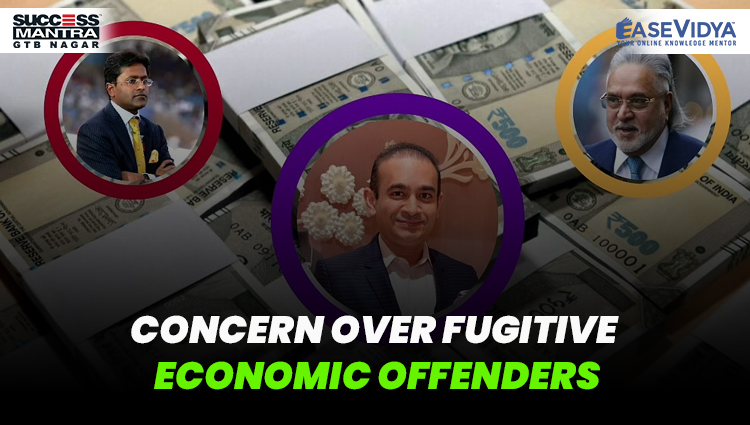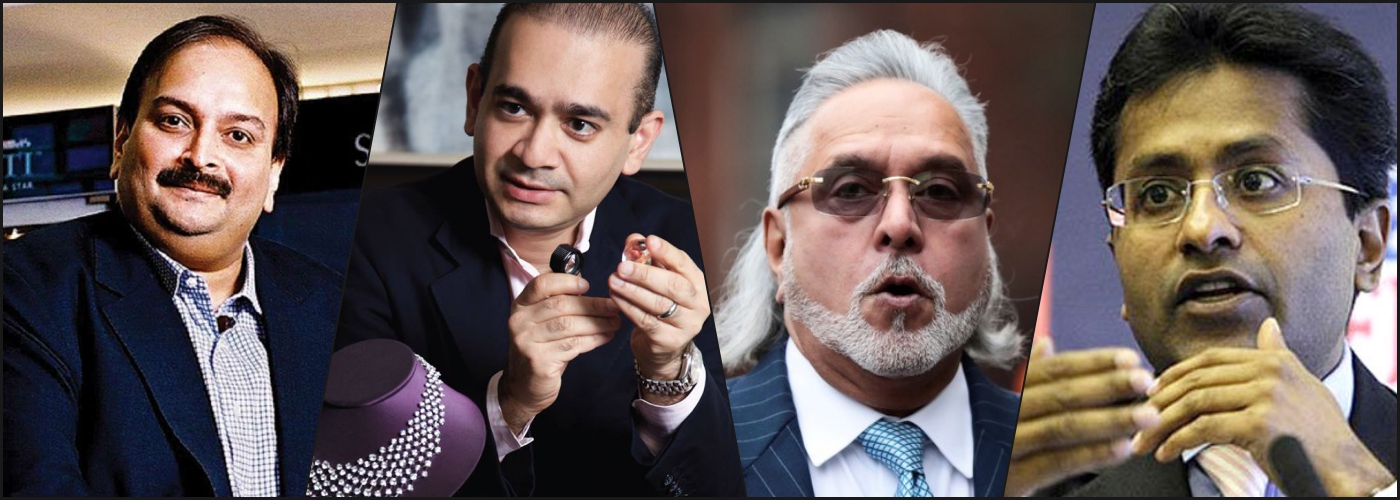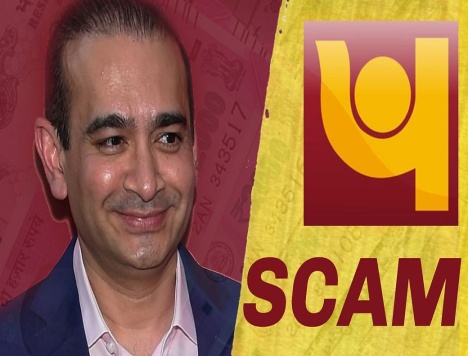
CONCERN OVER FUGITIVE ECONOMIC OFFENDERS
CONCERN OVER FUGITIVE ECONOMIC OFFENDERS

The Enforcement Directorate has transferred assets worth Rs. 8,441.50 crore to public sector banks that suffered losses to the tune of Rs. 22,585.83 crore due to frauds committed allegedly by Vijay Mallya, Nirav Modi and Mehul Choksi.
All the three have been declared 'Fugitive Economic Offenders' by PMLA (Prevention of Money Laundering Act) Court in Mumbai.
Extradition requests to the United Kingdom (UK), Antigua, and Barbuda, have also been filed against all the three accused.
Fugitive Economic Offenders Act, 2018:
About: It seeks to confiscate properties of economic offenders who have left the country to avoid facing criminal prosecution or refuse to return to the country to face prosecution.
Fugitive Economic Offender (FEO): A person against whom an arrest warrant has been issued for committing an offence listed in the Act and the value of the offence is at least Rs. 100 crore.
Some of the offences listed in the act are:
Counterfeiting government stamps or currency.
Cheque dishonour.
Money laundering.
Transactions defrauding creditors.
Declaration of a Fugitive Economic Offender:
After hearing the application, a special court (designated under the PMLA, 2002) may declare an individual as a fugitive economic offender.
It may confiscate properties which are proceeds of crime, Benami properties and any other property, in India or abroad.
Upon confiscation, all rights and titles of the property will vest in the central government, free from encumbrances (such as any charges on the property).
The central government may appoint an administrator to manage and dispose of these properties.
Bar on Filing or Defending Civil Claims:
The Act allows any civil court or tribunal to prohibit a declared fugitive economic offender from filing or defending any civil claim.
Further, any company or limited liability partnership where such a person is a majority shareholder, promoter, or a key managerial person, may also be barred from filing or defending civil claims.
The authorities may provisionally attach properties of an accused, while the application is pending before the Special Court.
Powers: The authorities under the PMLA, 2002 will exercise powers given to them under the Fugitive Economic Offenders Act.
These powers will be similar to those of a civil court, including the search of persons in possession of records or proceeds of crime, the search of premises on the belief that a person is an FEO and seizure of documents.
Prevention of Money Laundering Act (PMLA): Salient Features:
Punishment for money-laundering: Money laundering is punishable with rigorous imprisonment for a minimum of 3 years and a maximum of 7 years and Fine.
If the crime involves the Narcotic Drugs and Psychotropic Substances Act, 1985, the punishment can go up to 10 years, along with fine.
Powers of attachment of tainted property: The property is believed to be "proceeds of crime" and can be provisionally attached for 180 days. Such an order is required to be confirmed by an independent Adjudicating Authority
The Enforcement Directorate (ED) is responsible for investigating offences under the PMLA.
Also, the Financial Intelligence Unit – India (FIU-IND) is the national agency that receives, processes, analyses and disseminates information related to suspect financial transactions.
Burden of proof: A person, who is accused of having committed the offence of money laundering, has to prove that alleged proceeds of crime are in fact lawful property.
What is Money Laundering?
Money laundering is the process of making large amounts of money generated by criminal activity, such as drug trafficking or terrorist funding, appear to have come from a legitimate source.
Criminal activities like illegal arms sales, smuggling, drug trafficking and prostitution rings, insider trading, bribery and computer fraud schemes produce large profits.
Thereby it creates the incentive for money launderer to "legitimize" the ill-gotten gains through money laundering.
The money so generated is called 'dirty money' and money laundering is the process of conversion of 'dirty money', to make it appear as 'legitimate' money.
How does Money Laundering take place?
Money laundering is a three-stage process :
Placement: The first stage is when the crime money is injected into the formal financial system.
Layering: In the second stage, money injected into the system is layered and spread over various transactions with a view to obfuscate the tainted origin of the money.
Integration: In the third and the final stage, money enters the financial system in such a way that original association with the crime is sought to be wiped out and the money can then be used by the offender as clean money.
Bulk Cash Smuggling, Cash Intensive Businesses, Trade-based laundering, Shell companies and trusts, Round-tripping, Bank Capture, Gambling, Real Estate, Black Salaries, Fictional Loans, Hawala, False invoicing are some of the common methods of Money Laundering.
The legal framework in India to deal with Money Laundering
In India, the specific legislation dealing with money laundering is the Prevention of Money-Laundering Act((PMLA), 2002
The law was enacted to combat money laundering in India and has three main objectives
To prevent and control money laundering.
To provide for confiscation and seizure of property obtained from laundered money.
To deal with any other issue connected with money-laundering in India.
Under the PMLA Act, the Enforcement Directorate is empowered to conduct a Money Laundering investigation.
Apart from the provisions of PMLA, there are other specialised provisions such as RBI/SEBI/IRDA anti-money laundering regulations
Enforcement Directorate
Directorate of Enforcement is a specialized financial investigation agency under the Department of Revenue, Ministry of Finance.
On 1st May 1956, an ‘Enforcement Unit’ was formed, in the Department of Economic Affairs, for handling Exchange Control Laws violations under Foreign Exchange Regulation Act, 1947.
In the year 1957, this Unit was renamed as ‘Enforcement Directorate’.
ED enforces the following laws:
Foreign Exchange Management Act, 1999
The legal framework for the administration of foreign exchange transactions in India is provided by the Foreign Exchange Management Act, 1999.
Under the FEMA, which came into force with effect from 1st June 2000, all transactions involving foreign exchange have been classified either as capital or current account transactions.
Current Account Transactions: All transactions undertaken by a resident that do not alter his / her assets or liabilities, including contingent liabilities, outside India are current account transactions.
Example: payment in connection with foreign trade, expenses in connection with foreign travel, education etc.
Capital Account Transactions: It includes those transactions which are undertaken by a resident of India such that his/her assets or liabilities outside India are altered (either increased or decreased).
Example: investment in foreign securities, acquisition of immovable property outside India etc.
Resident Indians: A 'person resident in India' is defined in Section 2(v) of FEMA, 1999 as :
Barring few exceptions, a person residing in India for more than 182 days during the course of the preceding financial year.
Any person or body corporate registered or incorporated in India. An office, branch or agency in India owned or controlled by a person resident outside India.
An office, branch or agency outside India owned or controlled by a person resident in India.
MEHUL CHOKSI DECLARED AS ‘PROHIBITED IMMIGRANT’

• The Dominican Republic on declared fugitive businessman Mehul Choksi as a ‘prohibited immigrant’ for illegal entry into the country. Choksi is wanted in India for the Rs 13,500 crore PNB scam case, India’s biggest banking scam.
• Choksi had gone missing from Antigua and Barbuda on May 23, 2021, under mysterious circumstances. He had to reside in Antigua and Barbuda as a citizen since 2018.
• Two days later on May 25, he was detained in the country of Dominica for illegal entry. Lawyers of Choksi alleged that he was abducted from Jolly Harbour in Antigua and brought to Dominica on a boat.
• An order dated May 25, 2021, by the Dominican Ministry of National Security and Home Affairs that declared Mehul Choksi as a prohibited immigrant also directed the police to immediately remove Choksi from the Commonwealth of Dominica in accordance with Section 5 (1)(1) of the Immigration and Passport Act.
• The order further stated that the Chief of Police has been instructed to take all necessary actions to have you repatriated.
Who is Mehul Choksi?
• Mehul Choksi is a fugitive businessman who, along with his nephew Nirav Modi is wanted in India for the Rs 13,500 crore PNB scam case. Choksi is wanted in India for criminal breach of trust, criminal conspiracy, cheating and dishonesty, corruption, money laundering, delivery of property.
• A Special Prevention of Money Laundering Act (PMLA) court in March 2018 had issued a non-bailable arrest warrant against Mehul Choksi and his nephew Nirav Modi and Neeshal Modi.
• Mehul Choksi fled India in January 2018, few months before the PNB scam came to light. The government of India has been working on getting him extradited to India. Choksi was currently living in Antigua and Barbuda as a citizen.
What does repatriated mean? How is it different from extradition?
• The order dated May 25, 2021, by the Dominican Ministry of National Security and Home Affairs further stated that the Chief of Police has been instructed to take all necessary actions to have you repatriated.
• Repatriation means the process of sending the fugitive back to the country they fled. The Antigua and Barbuda government prefers that Choksi be repatriated directly to India from Dominica.
• Extradition is a formal process conducted by the governments of different countries to bring back or hand over the fugitives to the country they fled from so a trial can be carried out. Extradition is conducted by a bilateral or multilateral treaty between countries.
Law of Extradition
• Extradition is the process by which one state, upon the request of another, affects the return of a person for trial for a crime punishable by the laws of the requesting state and committed outside the state of refuge.
• The Supreme Court defined extradition as the delivery on the part of one State to another of those whom it is desired to deal with for crimes of which they have been accused or convicted and are justifiable in the Courts of the other State.
• Extraditable persons include those charged with a crime but not yet tried, those tried and convicted who have escaped custody, and those convicted in absentia.
Extradition Law in India:
In India, the extradition of a fugitive criminal is governed under the Indian Extradition Act, 1962.
This is for both extraditing persons to India and from India to foreign countries. The basis of the extradition could be a treaty between India and another country.
At present India has an Extradition treaty with more than 40 countries and Extradition agreement with 11 countries.
Extradition Treaty: About: Section 2(d) of The Indian Extradition Act 1962 defines an ‘Extradition Treaty’ as a Treaty, Agreement or Arrangement made by India with a Foreign State, relating to the extradition of fugitive criminals which extends to and is binding on India. Extradition treaties are traditionally bilateral in character.
Principles Followed:
The extradition applies only to such offences which are mentioned in the treaty.
It applies the principle of dual criminality which means that the offence sought to be an offence in the national laws of requesting as well as requested country.
The requested country must be satisfied that there is a prima facie case made against the offender. The extradition should be made only for the offence for which extradition was requested. The accused must be provided with a fair trial.
PNB SCAM EXPLAINED

• India’s Punjab National Bank (PNB), the second-biggest public sector lender, stunned the country’s financial sector when it announced in 2018 that it had discovered fraudulent transactions worth $1.77 billion (about Rs11,400 crore) at a single branch in Mumbai.
• By far the biggest ever detected by an Indian bank, the PNB fraud involved Mehul Choksi, and the main accused Nirav Modi, who are absconded from the country before news of the scam came through.
• Fugitive businessman Mehul Choksi, wanted in the Punjab National Bank (PNB) scam, was held in Dominica after his mysterious disappearance from Antigua and Barbuda.
• On Sunday, Prime Minister of Antigua and Barbuda Gaston Browne said that India sent a private jet to Dominica carrying documents related to the deportation of fugitive businessman Mehul Choksi.
What has happened?
• Choksi is accused of defrauding PNB of almost Rs 13,600 crore, went missing for the last three days from Antigua and Barbuda, of which he has been a citizen since early 2018. Investigators indicated that Choksi had escaped to Dominica on a boat probably en route to Cuba.
• With an Interpol lookout circular issued against him, Choksi was caught by the local Dominican police and is currently in the custody of the CID. He has alleged that he was abducted from Jolly Harbour in Antigua and Barbuda by policemen looking like Antiguan and Indian and taken to Dominica.
• Purported pictures of 62-year-old Choksi that have surfaced in Dominica shows him with red swollen eye and bruises on his hands.
• Choksi and his nephew Nirav Modi are wanted for allegedly siphoning Rs 13,500 crore of public money from the state-run Punjab National Bank (PNB) using letters of undertaking.
What are the cases against Mehul Choksi?
• Choksi is facing criminal proceedings by both CBI and Enforcement Directorate (ED). In 2018, the CBI had first named Choksi and his firms including Gitanjali Gems along with others based on a complaint received by Punjab National Bank (PNB) for alleged issuance of fraudulent Letters of Undertaking in their favour causing losses to the bank.
• Subsequently, the ED also filed a complaint alleging that Choksi and others were involved in money-laundering the proceeds of crime in overseas accounts.
• Choksi has been booked under the Prevention of Money Laundering Act and other sections pertaining to cheating, criminal conspiracy of the Indian Penal Code and relevant sections of the Prevention of Corruption Act. A similar case was also filed against Nirav Modi.
What is the PNB Scam?
• The PNB scam involved the issuance of fraudulent letters of undertaking (LOUs) by the bank after Choksi, the Modis and others colluded with bank officials.
• The LOUs were issued to Modi and Choksi’s businesses without any cash margins or securities, leading to heavy losses for the PSU bank.












0 Comment